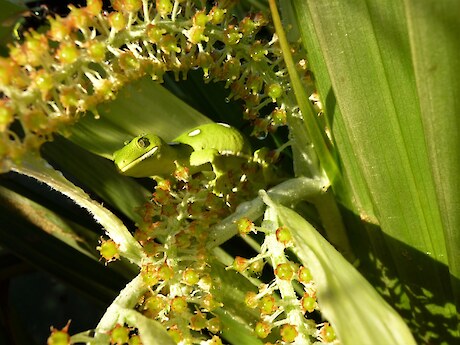New Zealand has two types of lizard – skinks and geckos – collectively mokomoko in te reo. Our native species aren’t found anywhere else in the world and are all fully protected. Sadly they are threatened by introduced mice, rats, stoats and cats.
Did you know?
- Lizards love to hide in small spaces
- Many of our geckos make ‘chirping’ noises, or even ‘bark’
- Skinks can blink, but geckos can’t – they have to lick their eyes to keep them moist
Auckland’s lizards
In Auckland you may come across these skinks. It is unlikely you’ll see any of the gecko species in the inner west, but please let us know if you do.
Copper skink (Oligosoma aeneum). Auckland’s most common garden skink isn’t threatened, but is secretive. It hides in rock gardens and compost heaps.
Ornate skink (Oligosoma ornatum). Secretive skink found in open areas with deep leaf litter. Widespread but often in low numbers.
Auckland green gecko (Naultinus elegans). Most easily found basking on foliage in sunlight this jewel of a gecko is more common in forest and scrub than in back gardens. Declining.
Forest gecko (Mokopirirakau granulatus). Mostly found in forest and scrub, moko-piri-rakau are declining except in areas with intense predator control.
Pacific gecko (Dactylocnemis pacificus). Generally nocturnal, this forest and scrub gecko hides beneath loose bark or in rocky outcrops.
Invaders
 Plague skink (or Rainbow skink)Unfortunately, the lizard you’re most likely to see in inner west Auckland is the invasive Aussie plague skink (aka Rainbow skink; Lampropholis delicata). They’re a little smaller than our native skinks, but breed rapidly laying clusters of eggs. It is thought that they out-compete the locals. There isn’t a great deal you can do about them other than avoiding spreading them to other areas. DOC have lots of great information on their Plague skinks page including a hotline for sightings outside the plague skink’s known range.
Plague skink (or Rainbow skink)Unfortunately, the lizard you’re most likely to see in inner west Auckland is the invasive Aussie plague skink (aka Rainbow skink; Lampropholis delicata). They’re a little smaller than our native skinks, but breed rapidly laying clusters of eggs. It is thought that they out-compete the locals. There isn’t a great deal you can do about them other than avoiding spreading them to other areas. DOC have lots of great information on their Plague skinks page including a hotline for sightings outside the plague skink’s known range.
Attracting lizards
You can also encourage lizards and geckos to your back garden with our guide to Make Your Garden Native-Friendly. DOC is also a great source of info on how to attract lizards to your garden.

